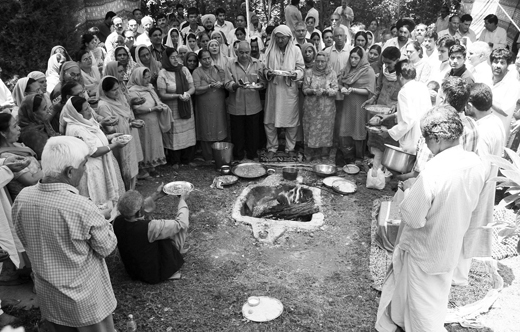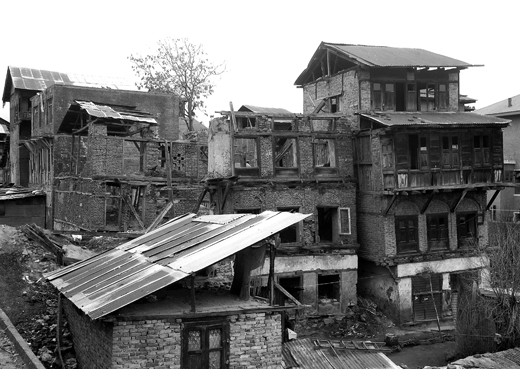Apart from suggesting statuses like ‘internally displaced’ and a religious ‘minority’ for Kashmiri Pandits, the Parliament’s standing committee, in its report, has emphasised the state governments inability to work for the betterment of the community. Syed Asma reports, how state government, despite sincere efforts, has failed to impress the Kashmiri Pandits
 The 31 member team of Parliament standing committee comprising of ten Rajya Sabha members and 21 Lok Sabha members seems extremely unhappy with the policies, expenditure, schemes and packages offered to the Kashmiri Pandits, migrants as well as non-migrants over the years.
The 31 member team of Parliament standing committee comprising of ten Rajya Sabha members and 21 Lok Sabha members seems extremely unhappy with the policies, expenditure, schemes and packages offered to the Kashmiri Pandits, migrants as well as non-migrants over the years.
The 179th report of the action taken by the union government on the rehabilitation of Kashmiri Pandit migrants was presented in the two houses of the Parliament on February 19, 2014. It is the 139th report on the rehabilitation of J&K migrants.
The report full of complaints, suggestions and recommendations was drafted after analysing schemes, hearing representative’s organization of J&K migrant and replies of state and Ministry of Home Affair. The migrant organizations include Panun Kashmir, All India Kashmiri Samaj, Delhi, All Kashmiri Pandit Conference, Joint Forum of KP organisation, JK National Panther’s Party and Terrorism Victims / migrants of Jammu region.
The Committee in their 79 pages report puts forward the desire of granting the Pandit migrants the status of an ‘internally displaced’ community and that of being a ‘minority’.
Going by the definition of United Nations report, Guiding Principles on Internal Displacement which says, internally displaced persons (IDPs or DPRE in many civil and military organizations which assist) are people who have been forced to leave their homes or habitual residence as a result of some armed conflict or generalized violence. The IDPs gets displaced within internationally recognized state border.
If at all KPs qualify the status of IDPs, they will not have much to rejoice. The other’s living as IDPs in India are in a pathetic condition.
More than 200,000 IDPs of Gujarat (in 2002), and of Orissa (in 2007 and 2008) can be taken as examples. There were inter-communal clashes between the Hindu majority population and Muslim and Christian minorities.
Indian government is being criticized for its policies regarding the internally displaced population in India. It is said that India has no national policy, no legislation or other mechanism to respond to the needs of people internally displaced by armed conflict or generalised violence.
“Thousands of Muslim IDPs in Gujarat continued to endure very poor living conditions, but their prospects of return remained dim as Hindu extremist groups expropriated their homes and land,” a report of The Internal Displacement Monitoring Centre (IDMC) reads.
IDMC established in 1998 by the Norwegian Refugee Council (NRC), is the leading international body monitoring internal displacement worldwide.
The Council further adds, “Thousands of Christian IDPs in Orissa were discouraged from returning, as some returnees have been forced to convert to Hinduism. IDPs’ attempts to integrate in their areas of displacement or to settle elsewhere in India have generally not been supported by the government.”
However, minority status may bring some respite and may help Kashmiri Hindus, both migrants and non-migrants in many ways.
Apart from getting the right to establish, run and administer their own educational institution, Kashmiri Hindus would be able to manage their own shrines and Temples. Besides, the Temple and Shrine Bill recently passed in state assembly would address their grievances.
But the Kashmiri Pandits belong to the Hindu religion and as such do not qualify for grant of minority status, the committee report says. However, it adds, the State Government feels that the issue of granting minority status needs to be examined by the State Government from all angles.
“The State of J&K has a special status in Indian Constitution. The government of J&K should look into the demand of the Kashmiri Pandits for conferring on them minority status keeping in mind their pitiable condition.”
Asking for the concession for the education of the wards of Kashmiri Hindu migrants, the committee calls them (KPs) not only a religious minority but economically deprived as well.
“Education is the only means that can improve a lot of their future generations. The Committee, therefore, recommends that the suitable scholarship scheme for such deprived J&K Migrants may also be evolved and extended to the affected Migrants in J&K, while extending the present scheme.”
The standing committee is also ‘disappointed’ with PM’s package of 6000 government jobs and other benefits like accommodation, medical allowances etc. The package is supposedly one of its kinds in India but has not satisfied Kashmiri Pandits.
Calling it an ‘ambitious package’, the committee says, the package has failed to show a significant response. The improvement on the ground is “scanty” as just one family has returned to the Valley since the announcement of the package, 2009.
Having apprehensions the team puts forwards its own reasons for ‘scanty response’- either the ‘ambitious’ is not attractive enough or the environment is not safe for them to return to the valley.
The Committee, therefore, is of the opinion that some more components of the PM’s package should be opened up for the Migrants without the condition of their returning.
It is also noted that other components of the PM’s Package except the employment and transit accommodation component, could not be initiated as they can come into force only after the Migrant families return to the Valley. The state government is suggested to be “more flexible” while implementing the package for “better results”.
This, in the view of the Committee, will serve as a confidence-building measure encouraging the families to return to the Valley.
The report reads, “The committee is of the view that though the objective of the government to help migrants return to Valley may be noble, but the results on the ground have been dismal.”
The modifications in the PMs Package are required to be carried out on a priority basis so as to make the Package more attractive for the Migrant community, the report suggests.
Adding to the list of their grievances, the Committee is, however, not convinced by the reply of the Government, as against a comprehensive package of Prime Minister amounting to Rs. 1618.40 crore in April 2008, only Rs. 104.52 crore till May 2013 has been expended by the State Government and since 2009 only four meetings of the Apex Committee have been held.
In view of the Committee, these open facts do not reflect a committed, sincere and sympathetic approach and course of action on the part of a responsive Government towards an aggrieved group of people of the State.
The standing committee believes that grievances of the affected people are not suitably addressed and Jammu is the neglected region in the PM’s package, the report reads.
Besides, the committee is saddened by the plight of migrant families of Budgam who have been forced by circumstances beyond their control to live in a resettlement camp in their home state. The committee, therefore, impresses upon the government that 505 units of transit accommodation may be allotted to them on a priority basis.
The Committee notes that more than 600 families are still residing in the Valley. The Committee also notes that about 31 families had to be shifted to a transit camp due to security reasons. The Committee, in view of the prevailing conditions, desires that the courage of such Kashmiri Pandit families still residing in the Valley should be appreciated and they should be provided appropriate security. They may also be provided other facilities as may be required.
Talking about the security of the community, the Committee advises the Government to be extremely cautious in clearing the names of militants for surrender. “Militants who have shown signs of change of heart may only be accommodated.”
The Committee is of the opinion that strict action should be taken against “perpetrators”.
The Government should also send a message to the affected persons with the assurance that if their cases had not been filed they should come forward to lodge their cases without any fear. The Committee would also like to be apprised of the status of filed cases along with the conviction of perpetrators.
The report covers almost every aspect of the Hindu community of Kashmir from accommodation to education, from medical allowances to jobs to security in the state. The 79-page report talks and suggests everything for the betterment of the Kashmir Pandits but hardly seem interested to get them rehabilitated back in Kashmir.
















